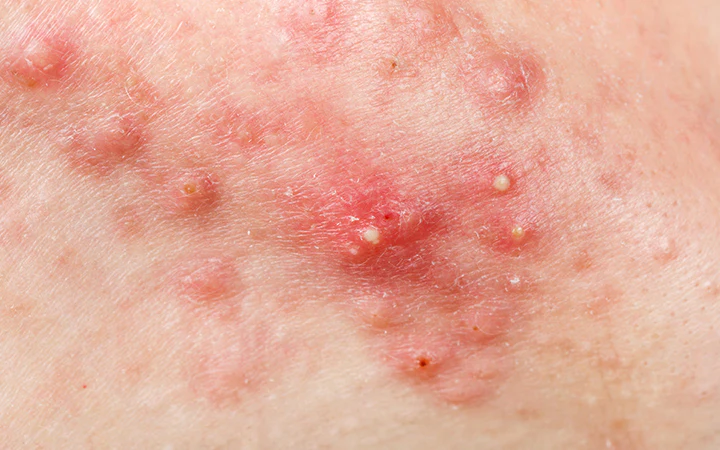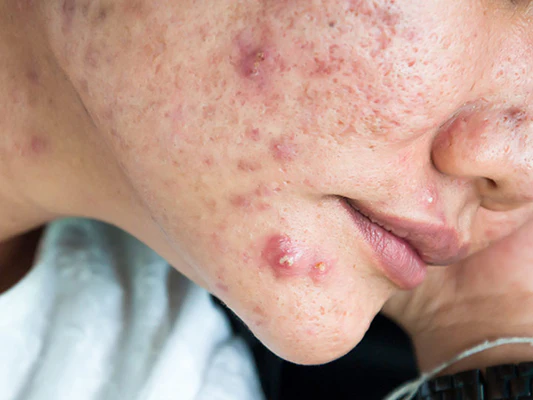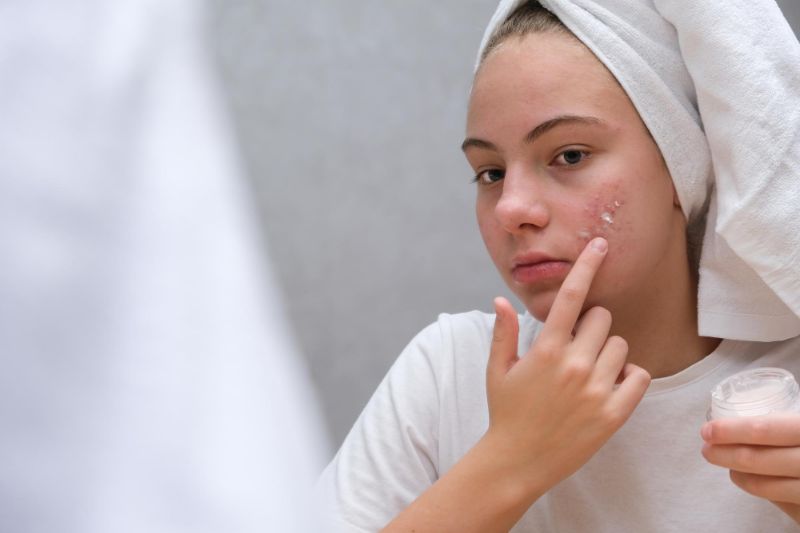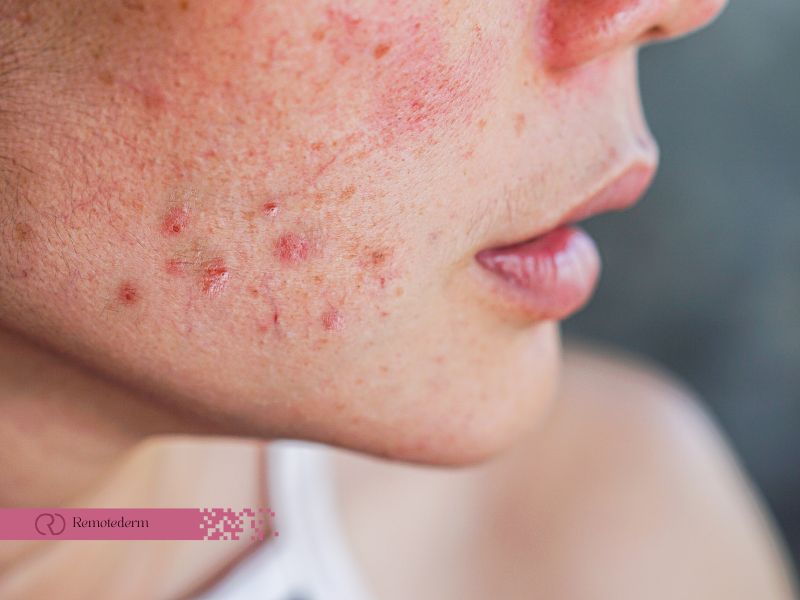Nodular acne is a skin condition that can be frustrating and challenging to manage. Unlike regular pimples, nodular acne involves larger, more severe breakouts that can be painful and persistent. In this comprehensive guide, we’ll delve into everything you need to know about nodular acne, from understanding its differences compared to cystic acne, to effective treatments you can try at home. So, let’s dive right in and demystify nodular acne!
What is Nodular Acne?
Nodular acne is a severe kind of acne that extends beneath the skin’s surface. It is distinguished by the appearance of big, painful bumps beneath the skin’s surface. These nodules are caused by an increase in oil production, which combines with dead skin cells and germs to block the hair follicles. Nodular acne, unlike typical pimples, lacks a “head” that can be popped, making treatment even more difficult.
Nodular Acne vs. Cystic Acne: Understanding the Difference
Nodular acne and cystic acne are often confused due to their similarities, but they do have distinct characteristics. Understanding the differences between nodular and cystic acne can guide appropriate treatment approaches and minimize the potential for long-term skin damage.
Nodular Acne
Nodular acne is a severe kind of acne characterized by big, painful pimples beneath the skin’s surface. These nodules are often firm and can vary in size. They result from the clogging of hair follicles with excess oil, dead skin cells, and bacteria. Nodular acne lesions can be stubborn and may take longer to heal, leaving behind scars.

Cystic Acne
Cystic acne shares similarities with nodular acne but is distinct in its formation. Cysts are sac-like structures filled with pus, dead cells, and oil. These deep-seated, inflamed lesions can cause significant pain and discomfort. Cystic acne is more likely to leave permanent scars due to its deep inflammation and potential for rupture.

Key Differences
Nodular acne primarily involves large, solid bumps, while cystic acne manifests as painful, fluid-filled sacs. Cystic acne tends to be deeper and more prone to scarring. Both types require professional treatment, which may include topical or oral medications, drainage, and lifestyle adjustments.
Treating Nodular Acne: Professional Options
If you’re dealing with nodular acne, seeking professional help is a wise step. Dermatologists can provide targeted treatments that address the root causes of your condition. Some of the most effective treatments for nodular acne include:
- Prescription Medications
Dermatologists frequently opt for a targeted approach by prescribing oral antibiotics, such as tetracycline or doxycycline, which play a dual role in alleviating inflammation and curbing bacterial growth underlying nodular acne. In more severe instances, the use of isotretinoin, a potent derivative of vitamin A, is a common recourse. Isotretinoin’s robust efficacy in managing nodular acne emanates from its ability to regulate oil production, shrink sebaceous glands, and mitigate the occurrence of acne lesions.
- Intralesional Corticosteroid Injections:
A highly specialized intervention involves the administration of corticosteroid injections directly into the inflamed nodules. This punctilious approach yields rapid reduction of inflammation, expedited healing, and consequently, a swifter amelioration of discomfort. By targeting the nodules precisely, these injections mitigate the risk of scarring and encourage the skin’s restitution to a healthier state.
- Chemical Peels:
Employing chemical peels as part of a comprehensive treatment regimen can effectively counteract nodular acne’s persistence. These peels, meticulously formulated with varying degrees of intensity, foster exfoliation, thereby unclogging pores and thwarting the genesis of fresh nodules. Their multifaceted action not only enhances the skin’s texture and appearance but also provides a preventive barricade against the recurrence of nodular acne lesions.
If you’re dealing with nodular acne, seeking professional help is a wise step. Dermatologists can provide targeted treatments and online acne prescription that address the root causes of your condition. With the advancement of technology, RemoteDerm offers a convenient solution for individuals across Canada. Through their online dermatology consultation services, you can receive expert advice and a personalized acne prescription within just 12 hours, regardless of your location.
How to Treat Nodular Acne at Home
While professional treatments can yield remarkable results, there are also steps you can take at home to manage nodular acne:
1. Gentle Cleansing
Establish a consistent and diligent facial cleansing regimen, incorporating the use of a mild, pH-balanced cleanser, performed twice daily. This ritual not only serves to eliminate the accumulated surplus of sebum, dirt, and impurities but also acts as a pivotal defence against the exacerbation of pore congestion. By diligently adhering to this cleansing protocol, you foster an environment that minimizes the likelihood of pore occlusion, thereby averting the potential escalation of nodular acne.
2. Topical Treatments
Go through the available over-the-counter solutions, bearing in mind the efficacy of constituents like benzoyl peroxide and salicylic acid. These active ingredients wield their influence by orchestrating a two-fold impact: attenuating inflammation and meticulously dislodging the debris that impedes the natural flow of the skin’s secretions. This twofold approach not only soothes the afflicted area but also contributes to the restoration of pore clarity, thereby engendering a landscape unfavourable to the proliferation of nodular acne.

3. Warm Compresses
Benefit from the therapeutic potential of warm compresses, a nuanced technique that delicately introduces controlled heat to the affected dermal zone. This modality not only bestows a palliative effect by assuaging discomfort but also facilitates the relaxation of surrounding tissue, which in turn encourages the unhindered drainage of the embedded nodules. By judiciously employing this adjunctive measure, you engage in an active role of promoting the expeditious and efficacious resolution of nodular acne manifestations, thereby expediting the skin’s journey towards recuperation.
How to Get Rid of Nodular Acne: Lifestyle Tips
In addition to medical and home treatments, adopting certain lifestyle changes can contribute to managing nodular acne:
1. Maintain a Healthy Diet
Eating a balanced diet rich in fruits, vegetables, and whole grains can promote overall skin health and reduce inflammation. Additionally, incorporating foods high in antioxidants, like berries and leafy greens, provides an extra shield against oxidative stress, contributing to a clearer and more resilient complexion.
2. Hydration
Drink plenty of water to keep your skin hydrated and support its natural healing processes. Adequate hydration aids in maintaining skin elasticity, facilitating the transportation of essential nutrients, and expediting the elimination of toxins, all of which play a pivotal role in mitigating the persistence of nodular acne and enhancing the skin’s regenerative capabilities.
3. Stress Management
High stress levels can exacerbate acne. Engage in stress-reducing activities such as yoga, meditation, or deep breathing. By embracing these practices, you not only foster emotional well-being but also engage in a direct intervention to modulate stress-induced hormonal fluctuations, a significant contributor to the aggravation of nodular acne. This holistic approach enhances your skin’s receptivity to treatments and augments the potential for lasting relief.
Final Thoughts
Dealing with nodular acne requires a comprehensive approach that combines medical expertise, tailored treatments, and self-care. This guide has clarified the nature of nodular acne, helping you understand its unique features and how to address them.
As you work towards healthier skin and confidence, knowledge is your ally. Differentiating between nodular and cystic acne allows targeted treatments that go beyond surface issues to tackle underlying causes.
Professional solutions like medications, corticosteroid injections, and chemical peels empower you to combat persistent nodular acne. Dermatologist expertise is crucial, but you can also care for your skin at home with gentle cleansing, topical treatments, and warm compresses.
Recognize the link between lifestyle and skin health. A balanced diet, hydration, and stress management enhance the effects of professional and home treatments. By incorporating these practices, you embark on a holistic journey to clearer skin and well-being.
Patience and persistence are key. Armed with knowledge and strategic approaches, you’re on a path to triumph over nodular acne, achieving healthier, happier skin.
FAQs
- Can I manage nodular acne at home?
Yes, gentle cleansing, topical treatments, and warm compresses can be used at home to complement professional interventions.
- What are some professional treatments for nodular acne?
Professional treatments include prescription medications, corticosteroid injections, and chemical peels, all aimed at addressing the underlying causes of nodular acne.
- What is the goal of professional treatments for nodular acne?
Professional treatments aim to alleviate inflammation, prevent scarring, and promote healing, ultimately leading to clearer and healthier skin.
- How do chemical peels prevent the recurrence of nodular acne?
Chemical peels exfoliate the skin and unclog pores, reducing the likelihood of new nodules forming and providing a barrier against future outbreaks.
